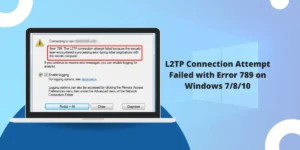How to Easily fix “Peacock not working with VPN”
Peacock TV, NBCUniversal’s streaming platform, has garnered substantial interest from viewers thanks to its immense catalog of TV programs, films, and live sports. Regrettably, the service is strictly limited to those within the United States, obligating global audiences to utilize VPNs to access its content library. Recently, many users have reported encountering a vexing problem: Peacock TV malfunctioning with VPNs. In this guide, we will explore the issue in depth, examine the likely explanations behind it, and furnish several workarounds to aid you in surmounting the Peacock VPN error.
Key Takeaways
- Peacock TV actively blocks most VPNs to enforce content licensing restrictions based on location.
- Bypassing the VPN ban on Peacock requires configuring your VPN in special ways to make it appear like normal traffic.
- The best VPNs for unblocking Peacock use residential IP addresses, port forwarding, obfuscated servers, and other stealth features.
- Free VPNs often don’t work with Peacock due to a lack of dedicated streaming features. Paid VPNs tend to offer better success rates.
- Manually allowing Peacock access through your antivirus/firewall can sometimes resolve VPN conflicts, preventing streaming.
What is Peacock VPN Error?
Before we explore the solutions, it’s important to understand the root cause of the issue. The Peacock VPN error occurs when Peacock TV detects that a user is accessing the service through a VPN, resulting in a block. This is because Peacock TV, like many other streaming platforms, enforces geo-restrictions to ensure that its content is only available within the United States.
Geo-restrictions are often put in place due to content licensing agreements between content creators, distributors, and broadcasters. These agreements restrict Peacock TV from streaming certain content outside of specific regions. To enforce these agreements, Peacock TV employs advanced VPN-detection technology to identify and block VPN users.
Why Doesn’t Peacock Work with My VPN?
When you try to watch Peacock TV using a VPN, geo-restrictions are usually the cause of the problem.
Peacock offers different content libraries depending on the type of resin that dances. Their system also prohibits accessing the service from an international IP address.
To enforce these licensing rules, Peacock uses advanced VPN-detection methods like:
- IP Tracking: They maintain a database of IP addresses associated with VPN services and block any traffic coming from them.
- Deep Packet Inspection: Peacock analyzes internet traffic to look for data signatures that match VPN connections.
- Geolocation Tracking: They look at your IP address location to verify you’re actually in an allowed streaming region.
When Peacock determines you’re using a VPN, it refuses to open streaming content and displays the “peacock TV not available with “VPN error message.
The only way to avoid the VPN block is to configure your VPN connection in special ways so that it appears like normal traffic to Peacock’s systems.
How To Get Peacock Working With a VPN
Getting Peacock to work with a VPN takes some trial and error, but it is possible in many cases. Here are some of the most effective methods:
Use a Credible Paid VPN
Free VPNs often need more dedicated features for streaming access. Premium services like ExpressVPN, NordVPN, Surfshark, CyberGhost, and others are the best VPNs for unblocking Peacock.
Paid VPNs have advantages like:
- Large networks of servers optimized for streaming.
- Fast connection speeds to support HD video.
- Apps with advanced settings for spoofing locations.
- Strict no-logging policies to protect your privacy.
- Reliable customer support if you need troubleshooting help.
The larger server networks of paid VPNs give you plenty of different IP addresses to cycle through if one doesn’t work for accessing Peacock.
Enable Obfuscated Servers
Obfuscated servers are specially configured to blend VPN traffic with normal HTTPS internet activity. This makes it much harder for streaming platforms to detect that you’re using a VPN.
NordVPN, Surfshark, and CyberGhost are examples of VPNs that offer obfuscated server options.
Enabling obfuscation features in your VPN app will help Peacock recognize your connection as a VPN, which frequently allows access to Peacock content.
Use Residential IPs and Port Forwarding
Another advanced VPN technique that helps evade VPN blocks is connecting through residential IP addresses and port forwarding.
VPN providers lease residential IPs that originate from household ISP networks instead of data centers. When combined with port forwarding, this makes your traffic appear just like any other house on the internet.
The leading VPNs grant access to residential IPs and port forwarding on certain servers, increasing your chances of bypassing Peacock’s geo-restrictions compared to typical VPN connections.
Switch Between Multiple Locations
If one VPN server isn’t working to get around the Peacock VPN ban, change to another server location and test access again.
Accessing streaming platforms through VPNs can be hit-or-miss, so keep switching locations until Peacock loads properly without any VPN errors.
Connecting through different cities or countries gives you new IP addresses to try. The more options your VPN offers, the better.
Clear Cookies and Cache
Before testing a new VPN connection, make sure to clear your browser cookies and cache. Streaming sites like Peacock sometimes store data about your IP that could interfere with VPN attempts.
Deleting this cached information allows each VPN connection to start fresh without any leftover cookies linking back to a previously blocked IP address or location.
Try Different Protocols
VPN protocols like OpenVPN and IKEv2/IPsec have certain data signatures that Peacock may be able to detect if looking closely.
Your VPN app likely lets you switch between protocols like WireGuard, OpenVPN, L2TP/IPsec, and others. Testing each protocol can help avoid protocol-based blocking while accessing Peacock through the VPN.
Use VPN Browser Extensions
Major VPN providers offer browser extensions for Chrome and Firefox that route only your browser traffic through their VPN servers, leaving other apps unaffected.
This gives you an encrypted tunnel specifically for accessing Peacock in the browser. With the rest of your internet traffic behaving normally, Peacock needs help detecting the VPN connection.
Whitelist Your VPN in Antivirus and Firewall
Sometimes, VPN traffic gets blocked by internet security suites, thinking it’s malicious encryption. Temporarily adding your VPN application to antivirus/firewall whitelists can resolve connectivity issues that interfere with Peacock access.
Remember to remove the VPN app from the whitelist when done watching Peacock since reduced security could be risky for general internet use.
Contact Customer Support
If you’re still seeing “Peacock TV does not work with VPN” even after trying these tips, reach out to your VPN’s customer support. They likely have experience troubleshooting streaming access and may suggest specific VPN servers known to work with Peacock.
Explaining exactly when and how the Peacock VPN errors occur will help support reps diagnose where the issues are happening. They can also submit bug reports to the VPN engineering team if it appears Peacock recently implemented new VPN blocks requiring a fix.
How to Bypass the Peacock VPN Error?
Now that we understand the problem, let’s explore various solutions to bypass the Peacock VPN error and access Peacock TV content from anywhere in the world.
- Choose a High-Quality VPN Provider
- Connect to a Different VPN Server
- Clear Your Browser Cache, Cookies, and History
- Disable Location Services on Your Device
- Use a Dedicated IP Address
- Use Smart DNS Proxy
1. Choose a High-Quality VPN Provider
The first and most important step in bypassing the Peacock VPN error is selecting a high-quality VPN service providers. Not all VPNs are created equal, and some are more adept at bypassing geo-restrictions than others. A reputable VPN provider should offer:
- A large network of servers, particularly in the United States
- Regularly updated IP addresses to avoid detection
- Fast and stable connections for smooth streaming
- Strong encryption and privacy features
- Responsive customer support
2. Connect to a Different VPN Server
If you’re already using a high-quality VPN provider and still encountering the Peacock VPN error, try connecting to a different VPN server within the United States. VPN providers often have multiple servers in various locations across the country, so switching servers can sometimes resolve the issue. This is because Peacock TV might have flagged the IP address you’re currently using, but not the alternative server’s IP address.
3. Clear Your Browser Cache, Cookies, and History
Your browser’s cache, cookies, and history can store information about your location, even when you’re connected to a VPN. This can lead to Peacock TV detecting that you’re outside the US and blocking your access. To resolve this issue, clear your browser cache, cookies, and history before connecting to the VPN and accessing Peacock TV. Here’s how to do it for some popular browsers:
- Google Chrome: Click on the three-dot menu in the top-right corner, select ‘More tools’ > ‘Clear browsing data’, and choose ‘All time’ for the time range.
- Mozilla Firefox: Click on the three-line menu in the top-right corner, select ‘Options’ > ‘Privacy & Security‘, and click ‘Clear Data’ under the ‘Cookies and Site Data’
- Microsoft Edge: Click on the three-dot menu in the top-right corner, select ‘Settings’ > ‘Privacy, search, and services’, and click ‘Choose what to clear’ under the ‘Clear browsing data’
4. Disable Location Services on Your Device
Some devices and browsers have built-in location services that can reveal your true location, even when you’re connected to a VPN. To prevent this, disable location services on your device before connecting to the VPN and accessing Peacock TV. Here’s how to disable location services on some popular platforms:
- Windows: Open the ‘Settings‘ app, click on ‘Privacy > Location’, and toggle off the ‘Location’ setting.
- macOS: Open ‘System Preferences‘, click on ‘Security & Privacy > Privacy‘, choose ‘Location Services‘, and uncheck ‘Enable Location Services‘.
- iOS: Open the ‘Settings‘ app, scroll down to ‘Privacy > Location Services‘, and toggle off ‘Location Services’.
- Android: Open the ‘Settings‘ app, tap on ‘Location‘, and toggle off ‘Use location’.
5. Use a Dedicated IP Address
Many VPN companies provide individuals dedicated IP addresses that are located specifically within the United States and other countries. Using an IP address solely assigned to you can make it less likely that streaming platforms are able to detect you are using a VPN. Get your own dedicated IP address from your VPN subscription if available for the purpose of avoiding IP detection by streaming services like Peacock.
6. Use Smart DNS Proxy
Overcome geographic limitations and access Peacock outside the United States. DNS proxy services such as Unlocator and Getflix offer dedicated streaming DNS proxies that are effective for circumventing Peacock access restrictions. Try using a Smart DNS service.
These DNS proxy providers offer solutions tailored specifically for streaming media that may be geo-blocked. By routing your internet traffic through their DNS servers, you can disguise your location and gain access to streaming platforms and content normally unavailable to you. A Smart DNS subscription easily enables bypassing territorial restrictions and expanding your streaming options.
Peacock restricts its availability in many locations for licensing and copyright reasons. However, Smart DNS masking allows you to appear in a permissible region so you can log in and start streaming your favorite Peacock shows and movies anytime, anywhere.
What is the meaning of “Accessing Peacock through a VPN is Restricted”?
Peacock likely blocks or limits access to their streaming service when you connect through a virtual private network or VPN. Some key points about Peacock and VPNs:
- Peacock may detect and block VPN IP addresses to restrict content access to only permitted regions. This is common for streaming services that license content for specific geographic territories.
- Peacock will likely still allow access if you use a dedicated IP address from an allowed region instead of a VPN IP. A dedicated IP address appears as a static IP from a permitted location, bypassing VPN restrictions.
- Peacock likely allows access through residential VPN servers in allowed regions but may still block access through most commercial VPN services. Some services are blocked while others may still work, hence the note that access is “restricted” rather than fully prohibited.
- There is no official word from Peacock on their VPN policies. Blocks seem to be implemented to maintain geographic licensing restrictions rather than announce a complete ban. Policies could theoretically change at any time.
- Workarounds for accessing Peacock through a VPN include using a dedicated IP address, DNS proxy service, or connecting to a VPN server within an allowed region. These methods can mask your real location and network details to circumvent VPN blocks.
- Many viewers find that Peacock VPN access works fine through certain servers or providers but not others. Trial and error may be required to find a solution. Dedicated IP addresses tend to provide the most reliable results.
Why Use a VPN With Peacock TV?
Although it can be tricky to set, there are good reasons you might want to use a VPN in combination with Peacock:
- Access Blocked Content: VPNs let you view country-specific Peacock libraries outside of normal streaming regions. For example, spoofing your location to the USA opens full seasons of shows that are only available domestically.
- Enhanced Privacy: A VPN prevents Peacock (and your ISP) from logging details about your streaming activity and viewing habits.
- Avoid Bandwidth Throttling: ISPs sometimes throttle traffic from bandwidth-intensive sites like Peacock. A VPN prevents throttling for faster streaming speeds.
- Enhanced Security: Public Wi-Fi hotspots carry risks of hackers spying on your connection. A VPN keeps Peacock streams protected from snoopers.
- Bypass Blackouts: Sports blackout rules are based on your location. Using a VPN can let you watch local team games that are normally blocked in your area.
Why Free VPNs Don’t Work Well with Peacock
It isn’t easy to find a free VPN that successfully unblocks Peacock. Here’s why free VPNs tend to fail:
- Tiny server networks with very limited IP choices.
- Lack of streaming-friendly features like residential IPs.
- There are no dedicated apps, making them harder to configure.
- Missing essential security features like a kill switch.
- Severely limited data allowances, as little as 2-15GB per month.
- Slow speeds and bandwidth throttling that interrupt streaming.
- Session timeouts require repeated reconnecting.
- Risk of log files being sold since they don’t charge for the service.
- VPN connections are frequently blocked as soon as they’re detected.
Troubleshooting Peacock VPN Errors
If you’re encountering issues like “Peacock TV detected VPN” or other streaming errors, here are some steps to troubleshoot:
- Refresh Your Browser: Close all browser windows and relaunch Peacock to clear any cached data related to the VPN block.
- Double Check Location Settings: Confirm your VPN app is connected to a supported Peacock region like the USA or UK.
- Verify the VPN is Running: Before launching Peacock, Check that the VPN app shows an active, successful connection.
- Reconnect the VPN: If the VPN has been connected for a long time, disconnect it and establish a fresh connection.
- Clear Cookies/Data: Delete browser cookies and site data for Peacock.com and NBC.com to remove any leftover footprint linked to a VPN IP.
- Try Different Protocols: Toggle between protocols like OpenVPN, IKEv2, Wireguard, etc. to avoid protocol blocking.
- Change VPN Server Locations: Cycle through different VPN server locations to find one that does not trigger Peacock’s VPN detection.
- Update VPN Apps: Make sure the VPN app and extensions are updated to the newest versions, which may work around recent blocking measures.
- Check Internet Security Settings: Temporarily disable antivirus, firewalls, VPN blocking features, and any other security tools that could conflict with the VPN connection.
Final Thoughts
Accessing Peacock with a VPN can definitely be frustrating when geo-restrictions get in the way. But as you can see, the streaming service doesn’t have to be permanently blocked.
With the right premium VPN provider and optimal configuration using the advice above, you can get Peacock working with a VPN again.
Some trial and error are necessary to find the specific VPN servers and settings that avoid triggering Peacock’s VPN detection systems. But the effort pays off for gaining safe access to extra content plus enhanced privacy and security while streaming.
The VPNs listed here were carefully selected for their proven track record of bypassing Peacock VPN bans. Relying on their expertise and tools is the best way to resolve “Peacock not working with VPN” errors.

 Verified A Professional Content Writer
Verified A Professional Content Writer
Riha Mervana is a professional content writer at SearchVPN.org, with extensive experience crafting engaging and informative content. She has established herself as an expert in the VPN industry, creating content that educates readers on the importance of online privacy and security.


